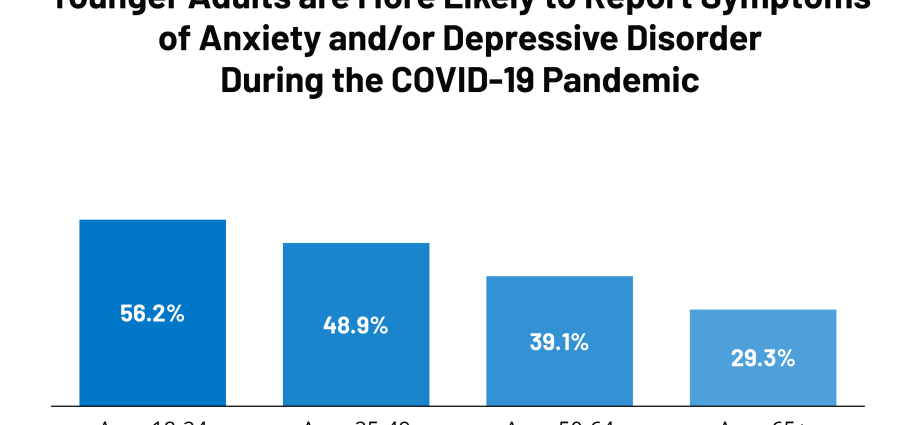ינהאַלט
אין לויט מיט זיין מיסיע, די עדיטאָריאַל באָרד פון MedTvoiLokony מאכט אַלע מי צו צושטעלן פאַרלאָזלעך מעדיציניש אינהאַלט געשטיצט דורך די לעצטע וויסנשאפטלעכע וויסן. די נאָך פאָן "אָפּגעשטעלט אינהאַלט" ינדיקייץ אַז דער אַרטיקל איז ריוויוד אָדער געשריבן גלייַך דורך אַ דאָקטער. די צוויי-שריט וועראַפאַקיישאַן: אַ מעדיציניש זשורנאַליסט און אַ דאָקטער אַלאַוז אונדז צו צושטעלן די העכסטן קוואַליטעט אינהאַלט אין לויט מיט די קראַנט מעדיציניש וויסן.
אונדזער היסכייַוועס אין דעם געגנט איז אַפּרישיייטיד, צווישן אנדערע, דורך די אַססאָסיאַטיאָן פון דזשאָורנאַליסץ פֿאַר געזונט, וואָס אַוואָרדיד די רעדאקציע באָרד פון מעדוואָילאָקאָני מיט די אַנערערי טיטל פון דער גרויס עדזשאַקייטער.
Scientists are still discovering the long-term effects of COVID-19. More and more information concerns the work of the brain and nervous system. According to psychiatrists, people who have contracted COVID-19 are more likely to develop mental disorders. These are disturbing reports.
- More and more studies show that COVID-19 affects the work of the brain and may increase the risk of mental disorders in people who have contracted the infection
- 1 in 5 people after contracting COVID-19 have developed disorders such as anxiety, depression or insomnia
- מער דערהייַנטיקט אינפֿאָרמאַציע אויף די TvoiLokony היים בלאַט
Mental disorders in patients after COVID-19
The SARS-CoV-2 coronavirus not only affects the respiratory tract, but also affects other organs in our body. More and more studies show that it can affect the work of our brain. Scientists studied people who contracted COVID-19 and found that some of them had mental health problems. The most frequently mentioned were anxiety, depression and insomnia. The researchers also found that these patients were also more likely to develop dementia.
זען אויך: COVID-19 Accelerates Brain Aging?
“People are concerned that people who have had COVID-19 will be at greater risk of mental health problems, and our findings … show that it is likely,” said Paul Harrison, professor of psychiatry at the University of Oxford.
According to the psychiatrist, health services must be ready to provide care to COVID-19 patients who develop mental health problems, especially as the results of the study may be underestimated.
זענט איר ינפעקטאַד מיט די קאָראָנאַווירוס אָדער עמעצער נאָענט צו איר האט COVID-19? אָדער אפֿשר איר אַרבעט אין די געזונט דינסט? וואָלט איר ווי צו טיילן דיין דערציילונג אָדער באַריכט קיין ירעגיאַלעראַטיז וואָס איר האָט וויטנאַסט אָדער אַפעקטאַד? שרייב צו אונדז אין: [עמאַיל פּראָטעקטעד]. מיר גאַראַנטירן אַנאָנימיטי!
Anxiety, depression and insomnia after developing COVID-19
Scientists analyzed the health cards of 69 million people in the United States, including more than 62. with confirmed COVID-19. Within three months of testing positive for COVID-19, 1 in 5 survivors are first diagnosed with disorders such as anxiety, depression or insomnia. The study was published in the journal “The Lancet Psychiatry”.
Interestingly, researchers also found that people diagnosed with mental disorders are 65 percent. more likely to be infected with SARS-CoV-2 coronavirus than people without the disorder.
Mental health experts who were not involved in the study said these findings are yet another confirmation that COVID-19 affects the work of the brain and may contribute to an increased risk of a number of mental disorders.
“This is likely due to a combination of the psychological stressors associated with this particular pandemic and the physical effects of the disease,” said Michael Bloomfield, consultant psychiatrist at University College London.
Simon Wessely, professor of psychiatry at King’s College London, said the finding that people with mental health disorders are more susceptible to contracting SARS-CoV-2 coronavirus supports what previous research has shown.
«COVID-19 affects the central nervous system, so it can exacerbate further disorders. Research confirms that this is not all, and that the risk is increased by previous poor health, »added Wessely.
די רעדאקציע רעקאמענדירט:
- א נייַע פרי סימפּטאָם פון COVID-19 איז יידענאַפייד. קען זיין דיסטורבינג
- Scientists examined the lungs of those who died from COVID-19. As it turned out?
- מינערווערטיק דזשין וועריאַנץ קענען ווירקן די שטרענגקייַט פון COVID-19
דער אינהאַלט פון די MedTvoiLokony וועבזייטל איז בדעה צו פֿאַרבעסערן, ניט פאַרבייַטן, די קאָנטאַקט צווישן די וועבזייטל באַניצער און זייער דאָקטער. דער וועבזייטל איז בדעה בלויז פֿאַר ינפאָרמיישאַנאַל און בילדונגקרייז צוועקן. איידער איר נאָכפאָלגן די מומכע וויסן, ספּעציעל מעדיציניש עצה, קאַנטיינד אויף אונדזער וועבזייטל, איר מוזן באַראַטנ אַ דאָקטער. דער אַדמיניסטראַטאָר טוט נישט טראָגן קיין קאַנסאַקווענסאַז ריזאַלטינג פון די נוצן פון אינפֿאָרמאַציע קאַנטיינד אויף די וועבזייטל. צי איר דאַרפֿן אַ מעדיציניש באַראַטונג אָדער אַן E- רעצעפּט? גיין צו halodoctor.pl, ווו איר וועט באַקומען אָנליין הילף - געשווינד, בעשאָלעם און אָן פאַרלאָזן דיין היים.










